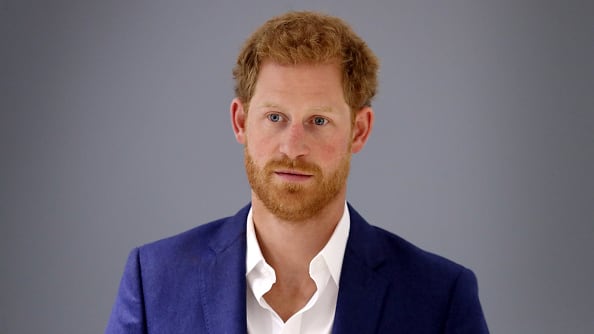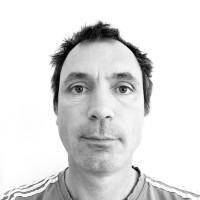Royalist is The Daily Beast’s newsletter for all things royal and Royal Family. Subscribe here to get it in your inbox every Sunday.
Prince Harry said that his family were “abusers” who had got “in bed with the devil” by cooperating with the media—and he could not remain silent in the face of “distortions” of the truth in his first solo interview Sunday night on British television.
However, Harry, who insisted he is now happy, also told ITV’s Tom Bradby that he loved his brother Prince William and father King Charles, speaking tenderly about them and saying he wanted to reconcile with them, and “100%” believed “forgiveness” could happen.
Asked how he could expect to reconcile with them despite having “taken a flamethrower” to family bridges, Harry said: “Well they’ve shown absolutely no willingness to reconcile up until this point. And I'm not sure how honesty is burning bridges. You know, silence only allows the abuser to abuse. Right? So I don’t know how staying silent is ever gonna make things better. That’s genuinely what I believe.”
Harry also said he felt “very at peace” and had “never been happier,” despite fleeing his “home country” with wife Meghan Markle and son Archie “fearing for our lives,” at the time of their so-called “Megxit.”
The revelations tumbled forth as Harry gave the first televised interview for his bombshell memoir, Spare, to be released tomorrow. The Spanish translation of the book was accidentally released six days early in Spain last week, and its contents have been widely reported. Later Sunday evening, his interview with Anderson Cooper on CBS’ 60 Minutes was set to be broadcast.
Harry also denounced a recent article by Sun columnist Jeremy Clarkson in which Clarkson said he wanted Meghan to be paraded through the streets naked and pelted with excrement. His words caused near-universal condemnation.
Harry said: “What he said was horrific and is hurtful and cruel towards my wife, but it also encourages other people around the U.K. and around the world, men particularly, to go and think that it's acceptable to treat women that way. To use my stepmother’s words recently as well, there is a global pandemic of violence against women.”
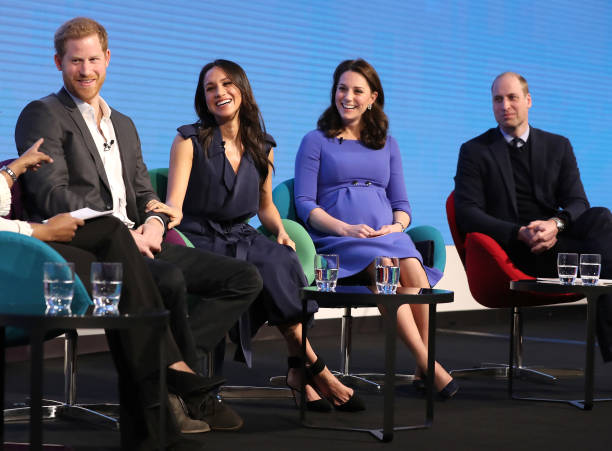
Prince Harry, Meghan Markle, Catherine, Duchess of Cambridge and Prince William, Duke of Cambridge attend the first annual Royal Foundation Forum held at Aviva on February 28, 2018 in London, England.
Chris Jackson - WPA Pool/Getty Images
The British press was “an antagonist” in the relationship he had with the rest of his family, Harry said. The tabloids “want to create as much conflict as possible.”
“The saddest part of that is certain members of my family and the people that work for them are complicit in that conflict.”
The interview featured extracts from the book read by Harry, including the opening sequence, in which Harry described being told by his father that his mother had died in a car crash.
Harry said he only cried “once at the burial” and described his bemusement at greeting the public who had “wet hands” from wiping tears away while he and William were “unable to show any emotion.” Harry also said William didn't want to be close to him at Eton.
In terms of the much-discussed incident when William pushed him over, he told Bradby: "He wanted me to—to hit him back, but I chose not to. But again, so much of the relationship between me and William and the way it played out was because of the narrative, or the—the distorted narrative that was being pushed through the British press. And some people within his office that were feeding him utter nonsense."
Of Charles, Harry read from Spare: “He’d always given an air of not being quite ready for parenthood: the responsibilities, the patience, the time. Even he, though a proud man, would have admitted as much. But single-parenthood? Pa was never made for that. To be fair, he tried.”
Speaking of his father’s plight as a widowed father, he said, “I never want to be in that position. That is part of the reason we are here now.”
Harry spoke tenderly about his father and brother, and appeared filled with regret and anguish at the collapse of their relationship, but also consumed with anger at what he perceived as their cooperation with the press.
“I love my father. I love my brother. I love my family. I always do. Nothing of what I've done in this book or otherwise has ever been to harm them or hurt them…After many, many years of lies being told about me and my, my family, there comes a point where, you know, again, going back to the relationship between certain members of the family and the tabloid press, those certain members have decided to get in the bed with the devil, right?”
“There’s no part of any of the things that I’ve said are scathing towards any member of my family, especially not my stepmother,” Harry insisted. “There are things that have happened that have been incredibly hurtful . . . some in the past, some current.”
“At the moment, I don't recognize them, as much as they probably don't recognize me,” Harry said of Charles and William.
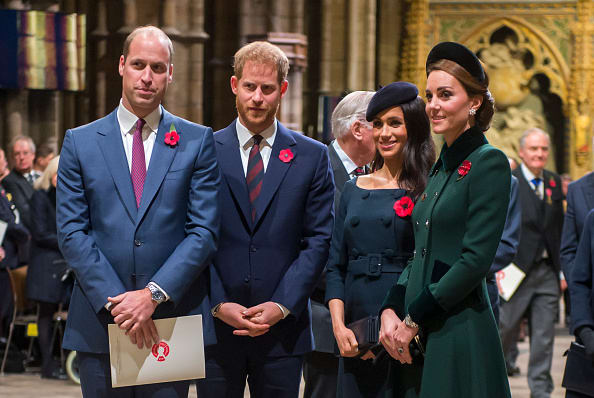
Prince William, Duke of Cambridge and Catherine, Duchess of Cambridge, Prince Harry, Duke of Sussex and Meghan, Duchess of Sussex attend a service marking the centenary of WW1 armistice at Westminster Abbey on November 11, 2018 in London, England.
Paul Grover- WPA Pool/Getty Images
Bradby tackled Harry on his attacks on his brother, saying, “But the portrait of your brother is harmful to him, I mean people may choose not to accept it or whatever, but it is harmful to him… I think he would say he found you emotional, defensive, he couldn’t get through to you, he found it extraordinarily frustrating, …”Harry shot back, “It's quite a list—list of things, assumptions you’re making.” Bradby replied: “I’m just saying I think that would be the counter narrative on the other side, that the truth is more nuanced and all the rest of it. Right? That would be the defense.”
Harry replied: “Well the truth, supposedly at the moment, has been there’s only one side to this story. Right? But there's two sides to every story. And you know, I have put in a lot of work and effort in to resolving my own trauma from many, many years ago, and I will continue to work on that, and—and I think other people within my family could do with that support as well. Because certainly from my perspective, um, you know, I've—I've learnt a hell of a lot. Again in the book I talk about unconscious bias, and being called a racist by the British press.”
Harry defended his decision to leave the royal family, saying: “We were dedicated to a life of service, as is proven by everything that we're doing now with the work that we do. And the proposal was very much on the table, publicly, which is we can't cope in this situation and we're gonna put our mental health first, we've asked for help and support.
“At that time I didn’t fully understand how much—or how complicit the family were in that pain and suffering that was happening to my wife, and the one group of people that could've helped or stopped this from happening were the very people that were—that were encouraging it to happen. And I sit here now in front of you asking for a family. Not an institution. I want a family. And I understand how that might be hard for them to be able to separate the two, but to me everything that I've witnessed and experienced over the years, there has to be a separation.”
When he told William and Kate about his relationship with Meghan, Harry said there was “a lot of stereotyping that was happening, that I was guilty of as well, at the beginning,” around her being an American actress. “Some of the things that my brother and sister-in-law—some of the way that they were acting or behaving definitely felt to me as though unfortunately that stereotyping was causing a bit of a barrier to them really sort of, you know, introducing or welcoming her in.”
At one stage Bradby, referring to the relationship between Meghan and William and Kate, asked: “But the impression is that—that they just—there's almost from the get-go it's just they don’t get on. Fair?”
Harry replied, “Fair.”
Asked why, Harry said: “Lots of different reasons. I had put a lot of hope in the idea that, you know, it’d be William and Kate and me and whoever. I thought the four of us would bring me and William closer together, we could go out and do work together, which I did a lot as the third wheel to them, which was fun at times but also, I guess slightly awkward at times as well. But, yeah, I don’t think they were ever expecting me to get into a relationship with someone like Meghan who had, you know, a very successful career.”
Harry told the story, reported in the Sunday newspapers, of William ordering him to shave his beard off for his wedding to Meghan.
Harry denied that he called his family racist in his famous interview with Oprah Winfrey.
Bradby said, “In the Oprah interview you accused members of your family of racism…” and Harry replied, “No I didn’t. the British press said that….Did—did Meghan ever mention that they're racist?”
Bradby clarified the question, saying, “She said there were troubling comments about Archie’s skin color.”Harry replied: “There was – there was concern about his skin color.”
Bradby said: “Right. Wouldn’t you describe that as essentially racist?”Harry then said: “I wouldn’t, not having lived within that family.”Bradby replied: “Right. But you don’t …”
Harry said: “So again going back to the difference between what my understanding is because of my own experience, the difference between racism and unconscious bias, the two things are different. But once it’s been acknowledged, or pointed out to you as an individual, or as an institution, that you have unconscious bias, you therefore have an opportunity to learn and grow from that in order so that you are part of the solution rather than part of the problem. Otherwise unconscious bias then moves into the category of racism.”
Bradby tried again, asking: “But I suppose I mean isn’t there a danger that people are gonna think bad—you know, you haven’t identified which members of the family …”
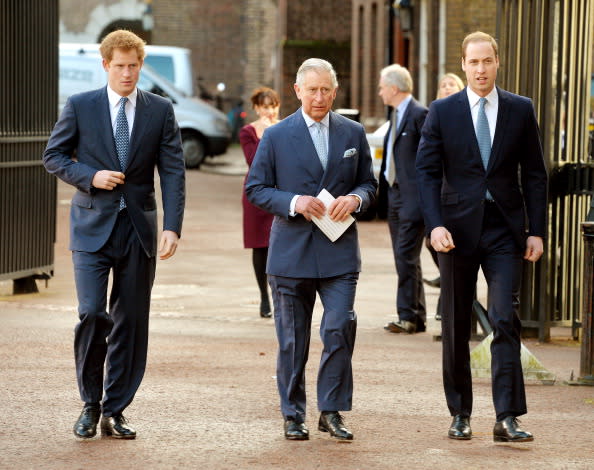
Prince Harry, Prince Charles, Prince of Wales and Prince William, Duke of Cambridge arrive at the Illegal Wildlife Trade Conference at Lancaster House on February 13, 2014 in London, England.
John Stillwell - WPA Pool/Getty images
Harry responded: “And I will never talk—and I will never talk about that. I mean what happened to Ngozi Fulani is a very good example of the environment within the institution, and why after our Oprah interview, they said that they were gonna bring in a diversity tsar. That hasn’t happened. Everything they said was gonna happen hasn’t happened. I’ve always been open to wanting to help them understand their part in it, and especially when you are the monarchy, at the—you have a responsibility and quite rightly people hold you to a higher standard than others.
“Certainly the media should. Right? So, the way that I’ve learnt it through my own experience and for what I’ve seen and what I’ve heard, yes, you’re right the key word is concern, which was troubling. But you speak to any other couple, mixed race couple around the world, and you will probably find that the white side of the family have either openly discussed it, or secretly discussed, you know, ‘What are the kids gonna look like?’ And that is part of a, you know, bigger conversation that needs to be had.”
Talking to Bradby about why he had once called a fellow soldier a racist epithet, Harry talked of “mistakes” he made in his 20s. “They were never intentional to harm anybody, but I recognise from that a level of unconscious bias within me that probably came from a combination of my upbringing, things I was exposed to and things that I saw in the media. And I made a choice to right that wrong.”
Harry “knew that I wasn’t a racist” and describes how that had been “a horrible place.”
“But there was a level of unconscious bias that existed within me that needed to be confronted”, Harry said.
In one moving section of the interview, Harry explained how his Harry then private secretary, Jamie Lowther-Pinkerton, had got him access to government files on his mother’s death. He said he was “eternally grateful” to Lowther-Pinkerton for editing out the most graphic pictures.
He said: “But you know, you can see that I saw the back of her blonde hair, you know, slumped on the back of the seat. There were other photographs, um, that would probably show my mother’s face and blood. Um, and those, I assume were the ones that Jamie removed.”
An extract from the book is read which runs: “Paps, (paparazzi) and reflected paps and refracted paps on all the smooth metal services and glass windscreens. Those men who’d chased her. They’d never stopped shooting her while she lay between the seats. Unconscious or semi-conscious. And in their frenzy, they’d sometimes accidentally photographed each other. Not one of them was checking on her, offering her help, not even comforting her. They were just shooting, shooting, shooting.”
Asked why he had written the memoir, Harry said he had endured having “38 years of having my story told by so many other different people with intentional spin and distortion,” and he wanted to now “own” his story.
He said that he done “everything” he could “privately to get through to my family” but said he was consistently told, “You’re imagining it.”
At the end of the interview Harry said that his departure from the royal family was “embarrassing for some people,” saying, “I’m very at peace. I am in a better place than I’ve ever been, and I think that probably angers some people, infuriates others, because just by the nature of me leaving, I’m sure they, they, some people always thought that Meghan would leave, right, but I don’t think they ever thought that I would leave as well, but, just by leaving that has, it’s, it’s embarrassing for some people. It wasn’t something that I would have necessarily chosen at the time, but you know, I own my story, and I own the results. But, I’ve got two beautiful kids and an amazing wife, like the happiness in my family now I have never felt anywhere else before.”
He added: “It’s been hard, I’m not going to lie, it’s been really hard at times, but I guess there’s also a lot of people who refuse to accept that I could be happy out here, because of what I’ve left behind. But the reality is I’ve never been happier.”
